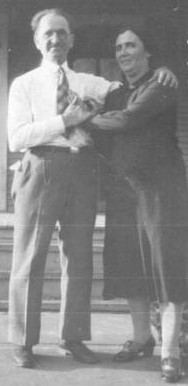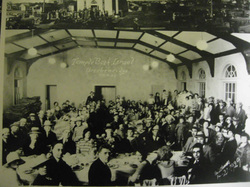What Would Grandma Have Told Me About Ukraine?

Professor Joe Goldblatt
I rarely find myself weeping uncontrollably at 3pm on a weekday afternoon. However, with all the sadness and troubles we have recently experienced as a global family, I suppose everyone has a trigger that releases their emotions. My trigger was my connection with and memory of my beloved grandmother.
As I watched the Ukranian Freedom Orchestra perform their national anthem I witnessed audience members and musicians with tears upon their cheeks. Soon, my memories turned to my Ukranian grandmother and I too was soon weeping with sadness, regret and pride.
My sadness was the obvious result of what is happening now in Ukraine and the fragility of the world in general. My regret was not having had the opportunity to ask my grandmother about her experiences in Odessa, Russia (now Ukraine) and as I dried my tears my pride was the due to the confidence with which these battered citizens of Ukraine raised their bows and played on, just as my own grandmother had persevered for 87 years.
Grandma Goldblatt, who we also called Grandma Susie, was born in 1878 in what is now Ukraine and she soon married my grandfather Henry D Goldblatt (Harry). She died in 1966 when I was 14 years old. My father collected me from school and told me that she had died. It was the only time I ever saw him also weep uncontrollably. Such is the emotional power of the loss of a mother.
After immigrating to America, Grandma Susie gave birth to eight children, one daughter and seven sons. To support their growing family, Harry and Susie moved to a small town in Texas where oil had been discovered. As a trader, Grandpa Harry drove a horse and wagon through the oil fields to sell essential supplies such as flour, sugar, pots and pans and other staples. Because of the sudden increase in population there was not enough housing for all families, so Grandma and Grandpa and their eight children slept in a tent for one year until an accomodation became available.
Whilst some may consider this a terrible hardship, I never once heard my Grandmother or her son, my father complain about their difficult living circumstances. In fact, shortly after the death of my father I visited the town of Breckenridge, Texas, where they had lived for many years and I noticed in the town museum a black and white photograph of the synagogue where they were members. There was Grandma, with a wide smile.

One of the few regrets I have after hearing the national anthem of Ukraine was missing the opportunity to ask Grandma about her life before she came to America. Therefore, I decided to use my imagination, based upon my knowledge of her, to conduct an interview with my deceased grandmother. I believed this was possible because of our closeness during my childhood.
Grandma and Grandpa lived with us throughout my entire childhood and she and I were especially close. We even shared a bedroom for the final three years of her life. We would often stay up late and into the wee hours of the morning playing the card game Canasta. Because Grandma Susie had a strong Yiddish accent, she often pronounced Canasta as “Nasty”.
Therefore, one morning when I sleepily entered my junior high school classroom and the teacher asked me why I was so tired I told her “I was up late last night playing nasty with grandma.” The shocked teacher raised her eyebrows and fortunately did not call social services.
Because of the extreme poverty Grandma Susie experienced throughout much of her young life she was very careful with preserving her food. She always sipped her tea through a suger cube placed under her upper lip. When she finished her tea she would remove the cube and place it in her saucer to be used for the next cup of tea.
Sometimes her preservation of food went to extremes. One evening, my sister, father and I joined Grandma Susie for a local fish supper in a favourite restaurant. At the end of the meal, papa excused himself and went to the toilet. Grandma then quickly ad secretly wrapped the left over fish in a napkin and hid it in her bosom.
As papa made his way back to the table she placed her index finger in front of her lips as if to say to my sister and I, “This is our secret.” During the car ride home papa began to smell fish and asked us about this foul odour. Grandma simple shifted her eyes from side to side to silence us once again.
Therefore, due to my closeness to this remarkable woman I believe I have a good idea of what Grandma might tell me today if I asked her about Ukraine and here is my imaginary conversation with her.
Joe: Grandma Susie, what was life like for you in Odessa?
Susie: Life? You call that a life? We had very little. We were forced to leave by the Russians during the pogroms and we lost everything else.
Joe: Then it must have been a relief when you sailed to America and married Grandpa Harry?
Susie: It was indeed a relief and also a struggle. We did not speak english, we had a few relatives in Indiana who helped us, but it was very hard.
Joe: How did you manage to get along with others?
Susie: Unlike Odessa, the local people in America could be trusted and they even helped us from time to time. I was busy raising eight children so even if it had been difficult, I was focused upon my home.
Joe: How do you feel about what is happening today?
Susie: The world has always had tyrants and this is the most recent one. I hope and pray that this time people all over the world will stand up and speak out without delay and say “Enough!”
Although Grandma Susie is no longer sitting beside me in person, hearing the national anthem of Ukraine brought her strong personality and sweet spirit back to life for me for a brief shining moment. Now, I must retain this memory of her in dominatable spirit in order for me to grow stronger, as exemplified by the musicians upon the concert stage. Grandma Susie would expect no less.
Professor Joe Goldblatt is Emeritus Professor of Planned Events at Queen Margaret University in Edinbutgh, Scotland. This article is an excerpt from his memoir entitled “The True Joy of Life”. To obtain a copy visit www.joegoldblatt.scot
